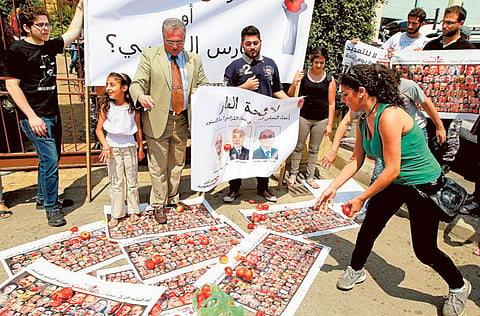The Emasculation of Lebanon’s state institutions
Parliament in de-facto extension after failure to achieve consensus

Beirut: For the third time in two weeks, the Constitutional Council failed to achieve quorum on Tuesday as two Shiite and one Druze members stayed away. Although a session was scheduled for next Friday, this would occur a day after the current Parliament’s term formally expired, which means that the two challenges against the parliament’s 17-month mandate extension would come to naught. Accordingly, the May 31, 2013 vote [97 for, 0 against, and 31 abstentions] would stand as a de facto extension. Under the circumstances, the two petitioners who insisted that the political maneuvers were unconstitutional, President Michel Suleiman and Deputy Michel Aoun [the Change and Reform leader who insisted on elections even under the 1960 electoral law], were significantly weakened. Both men wanted parliamentary elections, the first to work with a legitimated institution that would elect his successor, and the second hoping to be the designee.
In the event, Aoun’s opportunities diminished while those of Suleiman to accept a temporary extension increased. As a corollary, the two victors of these latest maneuvers turned out to be Speaker Nabih Berri and Progressive Socialist Party leader Deputy Walid Jumblatt, both of whom demonstrated that Lebanon’s political institutions were “Silly Putty” in their hands. Berri and Jumblatt ensured that lawmakers last elected in 2009 would now serve at least until November 2014, if not longer. Beyond the insolence of the political class, it looks that the de facto extension will lead to the appointment of a political government as backdoor deals between the Speaker, President Suleiman, Prime Minister designate Tammam Salam and, especially, Walid Jumblatt, reached an apex. It remains to be determined whether Salam’s government will be composed of 24 ministers under the so-called 8-8-8 formula, that will maintain a balance of power between March 14, March 8 and independents, or whether the March 8 faction will secure a veto power in any government to mimic its 2008-2010 performance.
Parallel to such a putative outcome, Beirut faced yet another crisis as several security appointments were scheduled between now and September 2013, including replacing the Army Commander, and which were hugely controversial. Simply stated, politicians who seldom trusted each other reached a point of no return in their mutual loathing, which was best illustrated by caretaker Energy Minister Gebran Bassil. Michel Aoun’s son-in-law, spoke to Al Sharq Al Awsat on Tuesday, declaring: “Hizballah stabbed us and stabbed democracy,” in the back. Bassil further told the pro-Saudi newspaper that Hizballah “dug the dagger even further with the issue of the Constitutional Council.” A rare reprimand indeed, but one that demonstrated the fragility of political life in a country with significantly weakened institutions.



